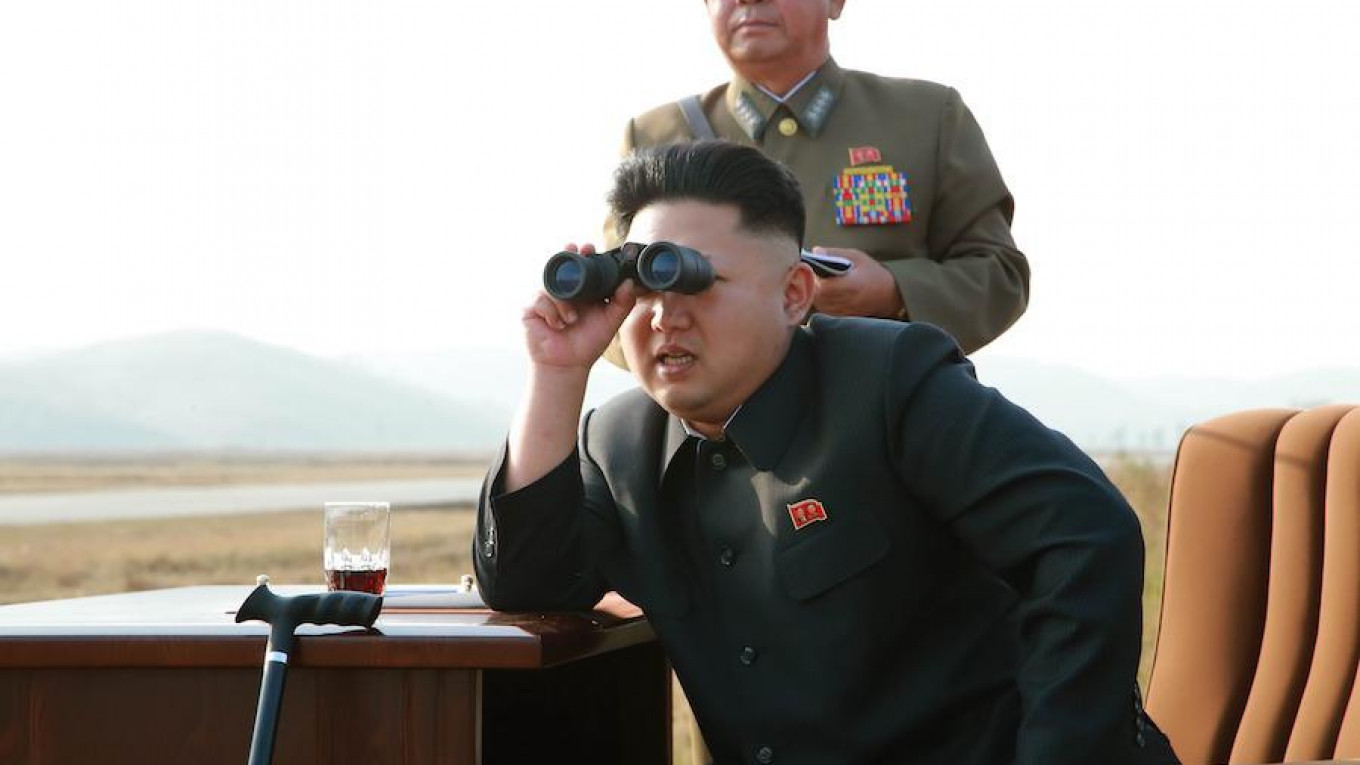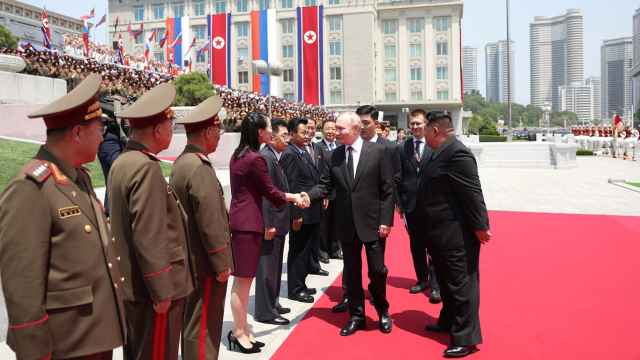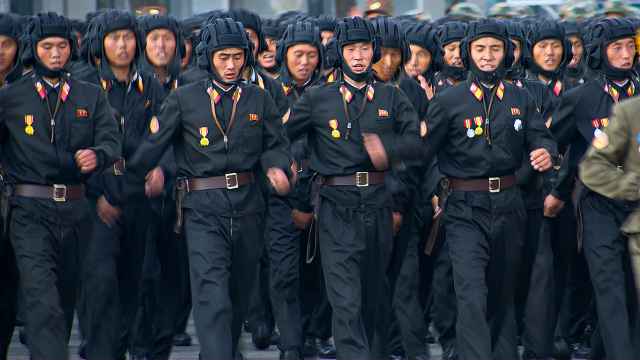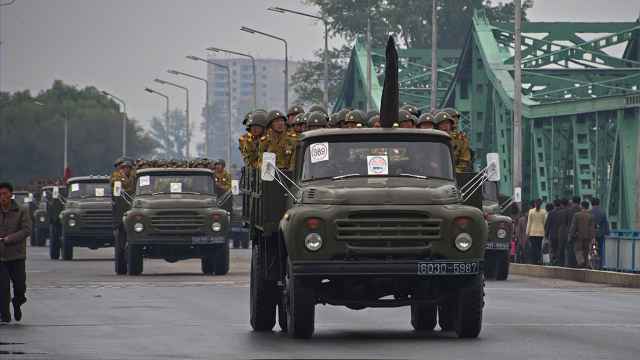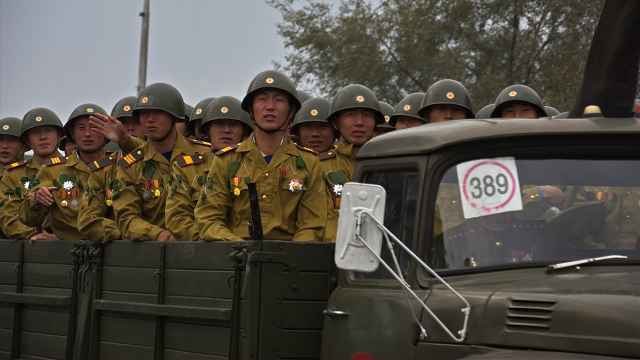According to the New York Times, Barack Obama’s final warning to Donald Trump was simple: watch North Korea.
With the Russian factor subsequently dominating headlines, Obama’s warning initially looked wide of the mark. Kim Jong-Un would, it seemed, take backseat to Vladimir Putin. But that was before March 6, the day Pyongyang fired four ballistic missiles toward the Sea of Japan.
Almost immediately, reports of renewed U.S. efforts to undermine North Korea’s nuclear program were leaked. The United Nations Security Council was then summoned for an emergency meeting, and the group condemned the launches. Even Russia played along.
“We are seriously concerned about launches from North Korea,” Kremlin spokesman Dmitry Peskov said.
The reality is more complicated, suggests Alexander Gabuev, an expert on Russian policy in the Asia-Pacific at the Carnegie Moscow Center think tank. Russia is more concerned with is Washington’s response to North Korea’s missiles, he says: “Russia sees U.S. options to address the missile threat and reassure its allies as more dangerous and destabilizing than North Korea’s behavior.”
On March 7, the U.S. made its chosen option clear with the deployment of THAAD missile interceptors to South Korea.
Cold War Comrades
For Russia, North Korea has only ever served one purpose: as a buffer state. The Soviet Union supported Pyongyang, seeing it as Communism’s eastern outpost and a bulwark against the U.S.’s pacific interests. Much of this support was economic and relations between North Korea and Russia today are a hangover from the past.
Following the Korean War, the USSR’s financial and technological aid were key to developing Pyongyang’s economy. But the collapse of the Soviet Union saw that aid abruptly stop, and relations between the two changed dramatically. Russia became a marginal economic player. Famine and economic crisis brought the North Korean regime to the brink of collapse.
Russia’s economic resurgence under Vladimir Putin’s regime brought the two allies together again. On May 5, 2014, Putin ratified an agreement with North Korea cancelling its $11 billion debt to the Soviet Union.
Russia’s Amur, Primorsk, and Khabarovsk regions have come to see the peninsula as a crucial source of cash. The Far East Development Ministry, created in 2012, has actively petitioned both Moscow and Pyongyang for economic cooperation.
The recruitment of laborers is the most prominent form of interregional cooperation. According to the Russian Ministry of Labor, in 2015, more than 47,000 North Koreans were working in Russia. Local businesses purportedly favor the foreign workers for their “diligence” and “hard work.” Meanwhile, the government in Pyongyang uses them to gain foreign currency by seizing up to half of their income.
These workers provide a lifeline against North Korea’s total isolation, says Pyotr Topychkanov, a foreign policy analyst at the Carnegie Moscow think tank.
But Russian cooperation with North Korea has not been without controversy. Deep in the woods of Siberia, North Korean slaves work in labor camps run by Pyongyang. Squalid living conditions, scarce food, and gruelling 10-year contracts are the order of the day.
All of this occurs on territory leased out by the Russian government.
Managing the Status Quo
Russia has always stood with the UNSC on matters pertaining to North Korea. But it has played both sides — maintaining economic and political relations with North Korea while scolding it for nuclear tests. Moscow has used its position to intimate that it has leverage over Pyongyang.
This leverage is illusory, says Vladimir Frolov, a foreign affairs analyst: Russia’s ties to North Korea are exaggerated as a form of status projection: “Moscow merely wants to be seen as being able to solve the problem, not actually do anything about it.”
A managed status quo is just about the only future Moscow has to offer the troubled peninsula. While Russia’s policy is to promote a non-nuclear Korea, a divided Korea keeps the U.S. away from Russia’s Far Eastern frontier.
If Beijing’s reaction to the March 7 deployment of an anti-missile defence system is anything to go by, it seems China agrees. Shortly after the U.S. deployed the THAAD missile defenses on March 7, there was an immediate, ominous response. Washington and Seoul “will bear the consequences,” China’s state-owned Xinhua news agency stated.
A Message from The Moscow Times:
Dear readers,
We are facing unprecedented challenges. Russia's Prosecutor General's Office has designated The Moscow Times as an "undesirable" organization, criminalizing our work and putting our staff at risk of prosecution. This follows our earlier unjust labeling as a "foreign agent."
These actions are direct attempts to silence independent journalism in Russia. The authorities claim our work "discredits the decisions of the Russian leadership." We see things differently: we strive to provide accurate, unbiased reporting on Russia.
We, the journalists of The Moscow Times, refuse to be silenced. But to continue our work, we need your help.
Your support, no matter how small, makes a world of difference. If you can, please support us monthly starting from just $2. It's quick to set up, and every contribution makes a significant impact.
By supporting The Moscow Times, you're defending open, independent journalism in the face of repression. Thank you for standing with us.
Remind me later.


